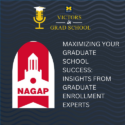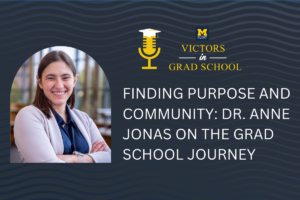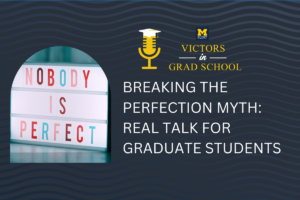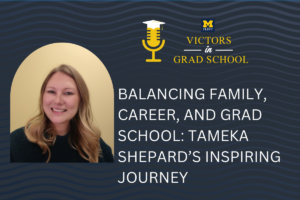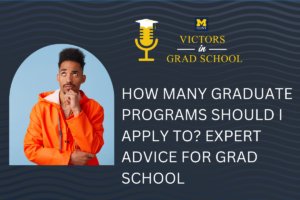Graduate school is an essential phase in one’s academic and professional journey, offering an intricate blend of learning, research, and networking opportunities. During the 2024 NAGAP Conference, a diverse group of experts provided valuable insights on strategies that can help graduate students maximize their success. Here’s a comprehensive guide drawn from their collective wisdom.
Leverage Campus Resources
- Bethany Satrom from Indiana University Bloomington highlighted the importance of utilizing all available resources on campus. Many institutions offer a wealth of support services such as career services hubs, faculty mentorship programs, and various networking events.
- Brett DiMarzo from Boston College emphasized the need for students to immerse themselves fully in their academic curriculum and extract maximum value from the experience. Accessing these resources can significantly enrich a graduate student’s academic life and bolster their professional readiness.
- Corey Carey from John Brown University urged students to explore lesser-known resources like academic advising and tutoring, which often go untapped. By navigating through their university portals and uncovering every nook and cranny, students can find numerous support structures that can enhance their academic journey.
Engage with Faculty and Mentors
- Keith Ramsdell from Ashland University underscored the importance of maintaining regular communication with academic advisors. Unlike undergraduate programs, graduate students often work closely with academic professionals in their field of study, making these relationships invaluable for guidance and future employment opportunities.
- Daniel Truesdale from the University of Chicago advised students to build strong networks with their professors and faculty. Engaging with faculty outside of classrooms and seeking mentorship can open doors to numerous networking opportunities and enrich the learning experience.
- Sarah Wenger from Indiana University noted the significance of having a champion or mentor throughout one’s graduate studies. A mentor can provide critical advice and support, helping students navigate the complexities of their academic and professional journeys.
Build and Nurture Your Community
Community building is a recurring theme among the experts.
- Brian Desrosiers-Tam from the University of Toronto** recommended that students find and actively engage with their community, whether through clubs, organizations, or professional groups. This engagement not only provides support but also enhances the overall graduate experience.
- Les Mackey from Fort Hays State University** emphasized the importance of connecting with a wide range of peers, faculty, and staff. Extending these connections beyond one’s primary area of study can lead to unexpected opportunities and collaborations.
Seek Interdisciplinary Experiences
- Sam Fleischman provided a unique perspective on the value of interdisciplinary experiences. He argued that integrating different fields of study enriches one’s education and broadens intellectual horizons. This approach not only makes individuals better professionals but also prepares them to tackle multifaceted challenges in the real world.
Network and Engage Professionally
- Jeremiah Nelson from Catawba College advised students not to overlook the importance of networking within their professional communities. Building connections beyond the academic environment can significantly impact career prospects.
- Tony Fraga from DD Agency** highlighted the importance of pairing academic achievements with industry-specific certifications. Earning certifications and adding them to your professional profiles can create a compelling advantage in the job market.
Focus on Personal Well-being
- Dr. Noranda Wright from Georgia Southern University spoke on the importance of balancing academic responsibilities with personal well-being. Graduate studies can be overwhelming, so it’s crucial to recognize stress triggers and take necessary breaks. Maintaining wellness is key to sustaining long-term success.
Stay Inquisitive and Persistent
- Kandice King from the University of Rochester** encouraged students to remain inquisitive and persistent. Asking questions and constantly seeking knowledge can drive continuous personal and professional growth. This attitude is especially vital for PhD students who need to persevere through challenging research and experimentation.
Embrace and Expand Your Network
- Anna Marie Bliss from WashU in Saint Louis suggested that students keep open communication lines with faculty, colleagues, and staff while being open to new ideas and cultural perspectives. Expanding your network and being adaptable can lead to significant academic and professional growth.
The insights shared by the experts at the NAGAP 2024 Conference offer a comprehensive blueprint for maximizing academic and professional success in graduate school. By leveraging campus resources, engaging with mentors, building communities, exploring interdisciplinary experiences, and maintaining personal well-being, students can navigate their graduate journeys with confidence and purpose. Whether you are just beginning your studies or are well on your way, these strategies provide valuable guidance to help you succeed.
TRANSCRIPT
Dr. Christopher Lewis [00:00:01]:
Welcome to the victors in grad school, where we have conversations with students, alumni, and experts about what it takes to find success in graduate school.
Dr. Christopher Lewis [00:00:11]:
Welcome back to Victor’s in Grad School. And this week, we’ve got a special episode of a number of different people that I had the chance to meet at the 2024 nag app conference. And if you’ve never heard of NAGAP, NAGAP is the National Association For Graduate Enrollment Management And graduate enrollment professionals come together every year at their annual conference to be able to talk about how to support graduate students like yourself. And at this conference, I talked to a number of different people and asked them the question of what key strategies or actions should students undertake during graduate studies to maximize their academic and professional success? This show is all about success, and every week I wanna bring you different thoughts, ideas, perspectives. And today, you’ve got a whole slew of a number of different people that are going to be giving you just that. Their strategies, their thoughts on that specific question. You’ll hear them answering the question in a lot of different ways. No editing has been happening in regard to what they said. And I wanted to make sure to share that with all of you. I hope you enjoy it and look forward to having you come back again next week for another great episode.
Anna Marie Bliss [00:01:31]:
Hi. My name is Anna Marie Bliss, and I’m the associate director of recruitment and admissions at WashU in Saint Louis. My top three strategies or pieces of advice that students should take during their graduate studies to maximize their academic and professional success would be to keep open lines of communication with staff and faculty and also their colleagues. The second one would be to be open minded and open to new ideas and different ways of thinking, especially as we think about different cultural upbringings and the ways that people are acting and engaging around us. And then finally, to seek mentorship from students who are more experienced, from faculty members, but also from key staff who are there to help aid in their success and think about career goals.
Bethany Satrom [00:02:12]:
Hi. I’m Bethany Satrom from the Indiana University Bloomington campus. I’m an admissions manager, so I mostly process applications for our faculty to review and a lot of data work. I think the key strategy to or action that students should take during their graduate studies to maximize their academic and professional success is to really utilize all the resources available on our campus, whether that be our career services hub or just talking with going to the networking events that we host in both in Bloomington and in other locations especially in their home cities or home countries. We try to be very involved in our international student life both on campus and off campus. I think students don’t take as much advantage of that at the School of Public Environmental Affairs that I work at as much as they maybe could or should and so I think that there are other schools that maybe have a little more success with that, but I think that we’re working on trying to implement more plans to make it more accessible and easier to obtain these resources.
Brett DiMarzo [00:03:16]:
Hi. I’m Brett DeMarzo. I’m the director of digital strategy and graduate enrollment at Boston College. And to answer the question, what key strategies or actions should students undertake during their graduate studies to maximize their academic and professional success is really to invest in the time and the effort into taking the most out of their experience. Talking with professors, getting into the academic curriculum, really putting their whole heart into the entire experience so that they really get the value out of that program.
Brian Desrosiers-Tam [00:03:49]:
Hi. My name is Brian Desrosiers Thame. I am assistant dean at the School of Graduate Studies at the University of Toronto. What key strategies or actions should students undertake during their graduate studies to maximize your academic and professional success? Well, I have three thoughts that I’m happy to share. I think as a graduate student who joins a new school, a new program, you know, you should make sure that you maximize all available resources that are available to you. Think about the writing center, the professional services that exist. So just make sure you’ll learn about them during your orientation, and once you do, make sure you access them. The second one I think would be find your community and be part of it. Even though you may be in a remote, hybrid, or in person event, make sure you stay engaged with the community. Get to know your graduate administrators, your graduate coordinators or chairs, but also your fellow students. And a good way to do that is to, even in grad school, join some clubs, some organization, and just be sure to be present. And then by developing that sense of community, you’ll have peers, colleagues who will be there to help you in the good and in the bad times. So good luck.
Corey Carey [00:04:49]:
My name is Corey Carey, and I’m a grad and online enrollment professional from John Brown University. And I would say that a key strategy that students should undertake during their grad studies to maximize academic and professional success is to seek out all of the things that universities offer but might not market. So different resources like academic advising, tutoring, things like that that are offered that maybe get lost in the shuffle of getting enrolled, getting getting ready for classes, getting your textbooks. So, if I were well, I am a graduate student and the things that I do is get online on my the portal that my university uses and just search every nook and cranny to find all the resources that are available to me because a lot of times resources will go untapped, unused just because students don’t know about them. So that would be my advice to students is to seek out all the resources that university offers.
Daniel Truesdale [00:05:51]:
My name is Daniel Truesdale. I’m the associate director of enrollment management at the University of Chicago for the applied data science program. Some of the advice I always give to incoming students, you have your formal support structures while you’re in the program, but also make sure to take advantage of connecting with your professors and your faculty, especially from a networking perspective. Part of grad school isn’t just the technical expertise that you’re going to gain, but it’s also the network and community that you’re going to develop. So that’s an amazing opportunity that you have to take advantage of. Also, remember not to kinda lose the forest amongst the leaves. More than likely, you’re you’re paying to be here. You’re dedicating your time.
Daniel Truesdale [00:06:29]:
We could be spent elsewhere. Make sure that you are gaining everything even outside outside of the curriculum that the program has to offer. So if that’s organizations, if that’s clubs, take advantage of those as well. So I always wanna press that because I think sometimes students forget that part of a graduate education is not just what you’re gonna learn in the classroom, but the community and friendships you’re gonna develop outside as well. So that would probably be my biggest advice for grad students.
Jamie Gleason [00:07:00]:
I’m Jamie Gleason from DD Agency. The question is what key strategies or actions should students undertake during their graduate studies to maximize academic or professional success? And I would really lean into 2 things. Graduate studies is all about network creation. So find the smartest person in your classes and get to know them more. And then ask your faculty members about internship experiences that might be applicable to the classes that you’re taking, and then really dig into the things that you love and find experience work experiences in those areas to flesh out your love a little bit more.
Jeremiah Nelson [00:07:38]:
I’m Jeremiah Nelson. I am the outgoing immediate past president of NAGAP and a faculty member at Catawba College, Kettner School of Business. And the strategies that I recommend for my graduate students are focused on not forgetting that their academic experience is not the only experience with being a graduate student. To maximize their success, what they also need to do is to network and to engage in their professional communities. It doesn’t matter how smart you are if people don’t know who you are. And so you need to make sure that you are both building your skills, but also that you are getting out into the world, engaging with your professional community, and making connections so that when it’s time for a job that you’re ready and that people are recommending you.
Kandice King [00:08:27]:
Hi. My name is Kandice King. I am with University of Rochester’s School of Medicine and Dentistry in Rochester, New York. As the director of graduate enrollment at SMD, I am, often asked by students about what kind of strategies they might utilize to maximize their success. And since we recruit for PhD students where we have a lot of persistence that is necessary in the success of experimentation and advancing science, always ask questions. Continue to build your persistence and continue to be inquisitive and curious throughout your graduate study and that will help you with both your academic and your personal success.
Keith Ramsdell [00:09:07]:
Hi, I’m Keith Ramsdell and I’m the vice president for enrollment management and marketing at Ashland University in Ashland, Ohio and I’ve been in that role for about oh three and a half years now and I’m pleased to answer this question the question specifically is what key strategies or action should students take during their graduate studies to maximize their academic and professional success? Now I think the one of the biggest things is to work constantly and regularly with your academic advisor unlike undergraduate programs where you’re working oftentimes with a professional advisor which is great, on the graduate side, the focus really is with academic professionals who are in your area of study who can really give you some wise direction, wise counsel on the courses to take, why those courses are being taken, who to take and those types of things. They’re also probably the best connected people to help you find employment after you’re done certainly I know on our campus our career center for life calling also assists graduate students with finding employment when they’re completed with their programs, but really those who are best connected to help you after you’re done with your program are gonna be your faculty, those are the folks who have very likely been out in the field, they’re connected in one way or another through their professional associations and through other networks that they’ve built, they can be a great resource for you and that’s the direction I would encourage you to go.
Les Mackey [00:10:31]:
Hey there. This is Les Mackey, and I currently work with the Graduate School at Fort Hays State University. So the question, maximizing academic and professional success in graduate studies. Gosh. So many things. I guess I’ll kind of split some 2 things and I’ll start with the academic success side of this. First off, I think it’s important to get out there and just be open to new knowledge and learning. Be open to new experiences altogether and don’t be afraid to get out of your comfort zone. At this point, when you get into grad school, you’ve already been in school for pretty long time. But in terms of just college, you’ve already been in college for 3, 4 years. And it’s easy to get comfortable and complacent with what you do know, but it’s okay not to know everything. I think one of the biggest things you can learn, and I learned in grad school, is that it’s okay to say, I don’t know, but I would like to. Maintain that growth mindset and stay curious. Now, looking at the professional success side of this, connect with faculty, staff, peers, and don’t limit yourself to just your primary area of study or just your department at your institution. Get out there and connect with everybody. If you get the opportunity to attend a conference, whether it’s to present research or for professional development purposes, connect with as many attendees as possible. If the chance ever arises to connect with alumni, go for it. Grow your network in the most meaningful way you can so you can leverage these connections during and beyond grad school. Any of these people could be a potential supervisor or colleague in the future, so take advantage of those opportunities.
Marcus Hanscome [00:11:59]:
I’m Marcus Hanscomb. I’m the director of enrollment marketing at DD Agency, and I’m 17 and a half years out of the higher ed side and working in universities with students. And students who wanna maximize their opportunities for academic professional success, there’s opportunities certainly with graduate student associations and student clubs and certainly academic organizations if possible. So I always encourage students to take advantage of that in their time. And sometimes students are busy, so they find ways to not do those things. But also taking advantage of the opportunity to maybe volunteer for research even. There’s a lot of things that are built into an academic program that students obviously have to do, but the students that really succeed and do well in the long term are the ones that jump a little bit further. They take that opportunity to volunteer with different faculty, maybe try something different than the research that they’re used to, just to expose them to other areas of the discipline. Sometimes students really find something that interests them and then that kind of points them in a different direction, particularly for dissertations or thesis research later on. So students really kind of expand are gonna do the best in the long run, and I encourage them to do that.
Dr. Noranda Wright [00:12:55]:
Hi. I’m Dr. Noranda Wright, associate dean of graduate student services at Georgia Southern University. And I think some of the key strategies or actions that students should take during their graduate studies to maximize their academic and professional studies range from providing, professional mentors to help them balance their self, look for a balance in higher education in their studies, figure out what works for them, what doesn’t work, see what the institution is offering for them to help them in their academic and their professional studies. A lot of times students are trying to overwhelm themselves to get things done instead of taking a break when it’s needed. They need to focus on their wellness while they’re doing their graduate studies. It’s a lot to be a graduate student and to be successful in academics and your professional life. So finding that balance where they can take time for themselves and be able to remove themselves from situations that causes them stress and realize that what what triggers them for that. So I think that’s one of the biggest things that they can use as strategies, finding themselves, knowing what their triggers are when they’re going through stressful situations, when they’re studying or writing papers, find that time to disconnect for a few minutes and just kinda recenter and refocus themselves.
Philip Guerrero [00:13:59]:
My name is Philip Guerrero. I’m the graduate program administrator for geosciences at the University of Texas at Austin. What key strategies or actions should students undertake during their graduate studies to maximize their academic and professional success? Probably top on the list as it is for any profession or individual in their jobs or jobs of the future is to network and to know as many people as they can. I always advise graduate students in my program to talk to career services, find out who are the people they need to talk to, where they’re going to work, what kind of industry they’re going to work in, and make those connections. They should also talk to their current faculty. Their faculty had to go to graduate school at some point, so they know about opportunities and how to be successful in their academic careers and professionally as well.
Sam Fleischman [00:14:49]:
Samuel Fleischman. Normally go by Sam Fleischman. When I think about what students should think about when doing their graduate studies to find success both academically and professionally, I think about as much interdisciplinary work as possible. An engineer is not as good as an engineer that understands philosophy and literature. Somebody who cares about literature will write better stories when they understand the cultural dynamics of the other students in other colleges. So as much as universities can support the intersectionality, inter correspondence, interdisciplinary approach to help people take their level of expertise, which they are growing in, and align it with other people who are just as passionate about what they’re growing in, I think the world will be a better place.
Sarah Lemus [00:15:40]:
Hello. I’m Sarah Lemus. I’m a graduate admissions coordinator. And to answer this question would be to have students more engaged in organizations, clubs, participate in different social events to network. And so just to, again, make those connections outside of their labs and just be able to come into contact with other people to help them perhaps in the future on their professional and academic success.
Tony Fraga [00:16:13]:
My name’s Tony Fraga. I am the CEO of DD Agency, and I’m gonna answer a question here about key strategies and actions that I think students should undertake during their graduate studies to maximize their academic and professional success. And you’ve invested so much in this graduate program, you’re working hard to do it, but you need to pair it with practical industry specific certifications. The ones that you literally could put as like badges on your LinkedIn profile. You pair those certifications with your graduate degree, and that’s a one two combo that employers can’t say no to.
Sarah Wanger [00:16:49]:
Hello. I’m Sarah Wenger. I’m the executive director of the Kelly Direct online MBA at the Kelly School of Business at Indiana University. One key strategy or action I think the graduate student should take is making sure before you begin your studies to think about who your champion’s gonna be, to think through the person, the people, the group, the resource that you’re gonna use to get yourself through your program. When I went through school, I had a mentor and I made sure that I utilized her throughout my graduate studies and on through my doctorate to just talk to and ask questions and really just make sure that I was on the right track.
Dr. Christopher Lewis [00:17:25]:
The University of Michigan Flint has a full array of masters and doctorate programs if you are interested in continuing your education. Whether you’re looking for in person or online learning options, the University of Michigan Flint has programs that will meet your needs. For more information on any of our graduate programs, visit umflint.edu/graduateprograms to find out more. Thanks again for spending time with me as you prepare to be a victor in grad school. I look forward to speaking with you again soon as we embark together on your graduate school journey. If you have any questions or want to reach out, email me at flintgradoffice@umflint.edu.

